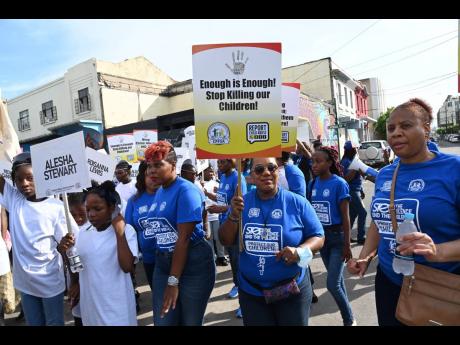Experts appeal for stronger family focus to shield kids from violence
Rosalee Gage-Grey, CEO of the Child Protection and Family Services Agency (CPFSA), is bemoaning the fact that 70 children have died violently across the island since last October, saying this reflects the normalisation of violence in the society in which not even the most vulnerable are spared.
“Eight in 10 Jamaican children are regularly subjected to violent discipline methods at home, which includes psychological as well as physical violence. About 65 per cent of children in schools say that they have been bullied, and close to 80 per cent say they witness violence in their communities and in their homes,” Gage-Grey disclosed on Friday at a march and rally in downtown Kingston.
The event, which was organised by the CPFSA to bring awareness to the increasing levels of violence against minors, saw scores of children, advocates and parents marching from St William Grant Park to the Secret Gardens Monument, where a wreath was laid in memory of the children who have died violently or tragically.
Marches were also held in Westmoreland, St Ann and St Elizabeth on Friday ahead of World Day for the Prevention of Child Abuse, which is being observed today.
Gage-Grey said that, so far this year, her office has received 11,576 reports of child abuse, with the most prevalent cases being neglect, physical abuse, sexual abuse, emotional abuse, child labour, bullying in children exhibiting behavioural issues. and child trafficking.
She said that some one billion children globally between the ages of two and seven have experienced some type of violence, which impacts their development.
Acknowledging that the issue of children and violence is multifaceted and complex, Gage-Grey said that a holistic approach is needed to properly address the problem.
“Prevalent social norms, cultural practices and the normalisation of violence contribute to some of the violence,” she said. “Child abuse is a serious problem that is plaguing the nation.”
But children are not just victims of violence. The police recently disclosed that nearly 900 children have been implicated in major crimes in the country over the last four years.
According to the CPFSA head, these children are often mirroring what they see around them and are often dealing with unaddressed trauma.
“We know that sometimes adults do draw them into antisocial behaviour. A lot of children have been abused and are not effectively coping with the trauma from that abuse, and that pulls them into that direction. So our efforts are to make sure that we are assessing our children and getting the right intervention ... ,” she said.
Gage-Grey also noted that lack of parental and community involvement in the development of children contributes to the problem.
It is a view shared by Dr Herbert Gayle, social anthropology lecturer at The University of the West Indies (UWI), Mona.
Noting that a parent should be stable and consistent, Gayle said that more than 99 per cent of children involved in criminal acts have poor parental guidance. He said children whose parents are unemployed, working multiple jobs, or engaged in crime, are more vulnerable to be recruited into gangs.
It is why he argues that any intervention aimed at preventing children from getting involved must start with addressing the family structure.
“I keep seeing people treating children and isolating them as if they are an entity in themselves. In the most violent communities, only about 10 per cent of households are headed by children, … which is an indicator of extreme chaos, where one of every 10 households you go to, it’s a boy or a girl who is under the age of 18 who is the head of the household,” he said.
“We should identify these homes and begin to work through the schools … . Every single country in the earth where these families are rescued, the murder rate dips dramatically,” he added.

